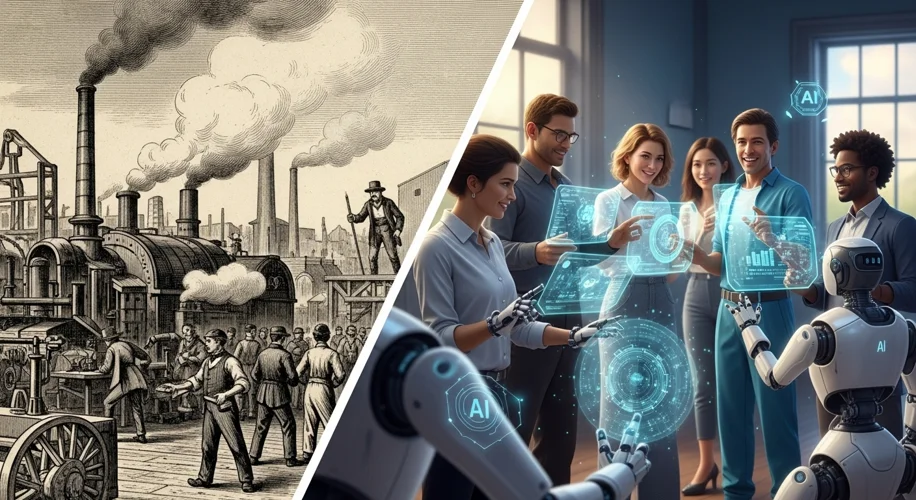Hey there! Grab a mug, settle in. I’ve been thinking a lot lately about all the buzz around AI – you know, the ChatGPTs, the self-driving cars, the whole nine yards. It’s exciting, a little scary, and sometimes, honestly, a bit much to take in. But here’s the thing: as I watch it all unfold, I can’t help but feel like I’ve heard this tune before.
It reminds me, weirdly enough, of the Industrial Revolution. Stick with me on this, it’s not as dry as it sounds.
When Smoke Stacked Up and Life Flipped Upside Down
Imagine, for a second, what it must have been like in the late 1700s and early 1800s. For centuries, life was pretty much the same: farming, manual labor, small workshops. Then, boom. Suddenly, steam engines start showing up. Looms weave fabric faster than any human ever could. Factories spring up in places where there used to be fields.
It wasn’t just a new gadget; it was a whole new way of living. People moved from quiet villages to bustling, grimy cities. Jobs that had been passed down for generations – weavers, artisans – suddenly became obsolete. Can you imagine the fear? The confusion? There were even groups, like the Luddites, who famously smashed machines, terrified they’d lose their livelihoods. They saw the disruption, the unemployment, the loss of traditional skills, and they felt powerless.
And honestly, who could blame them? Their world was changing at warp speed.
The Echoes in Today’s AI World
Fast forward to today. We’re not seeing steam engines, but we’re seeing algorithms writing code, creating art, and diagnosing diseases. We’re talking about AI automating tasks that used to require human brains. Sound familiar?
The fear of job displacement? Absolutely. “Will AI take my job?” is a question on a lot of minds right now, much like “Will that spinning jenny take my job?” was back then. And just like then, entire industries might shrink or disappear, while entirely new ones emerge.
But here’s the crucial part: the Industrial Revolution didn’t lead to mass, permanent unemployment. It led to a different kind of employment. People learned new skills. New jobs appeared – factory managers, engineers, train conductors, urban planners. It was a painful transition, yes, but it eventually led to widespread prosperity, new innovations, and a quality of life unimaginable before. It created the modern world as we know it.
What We Can Learn (And What We Should Do)
So, what’s the takeaway for us now, watching AI unfold?
First, don’t panic. Humanity has navigated massive technological shifts before. We are adaptable.
Second, expect disruption. Just like steam power changed everything from transportation to manufacturing, AI will reshape nearly every sector. This means some jobs will change, some will disappear, and many, many new ones will be born – jobs we can’t even conceive of yet. Think data ethicists, AI trainers, prompt engineers, digital world builders.
Third, the key is adaptation and education. Back then, it was learning how to operate a machine or manage a factory. Today, it’s about understanding how to work with AI, how to leverage its power, and how to develop skills that are uniquely human – creativity, critical thinking, emotional intelligence. These are the skills AI can’t easily replicate.
We’re in another pivotal moment, a “steam engine moment” if you will. It will be messy. It will be challenging. But if history is any guide, it will also open up incredible new possibilities. Our job isn’t to stop the future, but to shape it responsibly, ensuring that the benefits of AI are broadly shared, just as we eventually learned to manage the benefits of industrialization. It’s about building the future, together.

